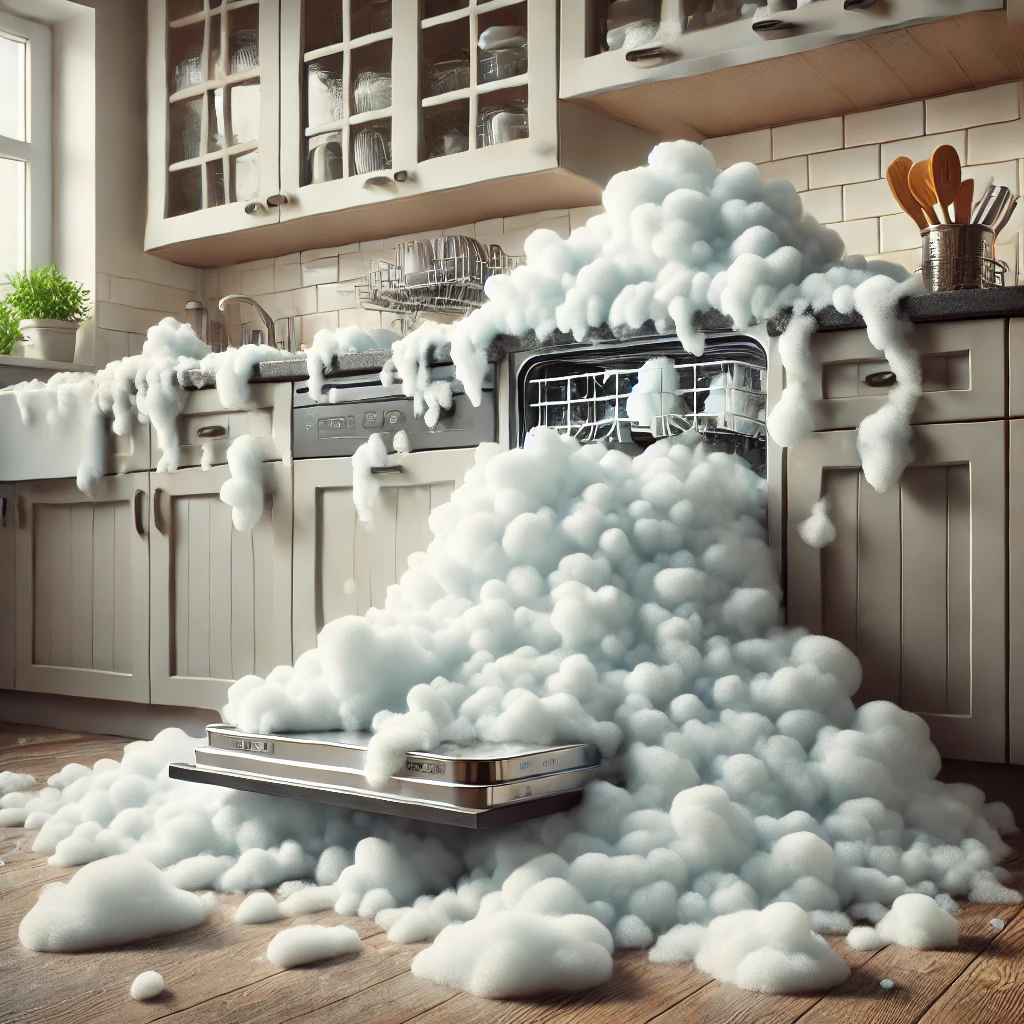
Washing Up Liquid In Dishwashers
Using washing up liquid in your dishwasher might seem like a convenient solution when you’re out of dishwasher detergent, but it can lead to a host of problems. Dishwashers are designed to work with specific types of detergents, and using the wrong kind can damage your appliance and make a mess. Here’s why you should avoid using washing up liquid in your dishwasher and what you should do instead.
1. Excessive Suds
Washing up liquid is formulated to create lots of suds, which is great for hand washing dishes but terrible for dishwashers.
Problems Caused by Suds:
- Overflowing Foam: The excessive suds can overflow from the dishwasher, spilling onto your kitchen floor and creating a slippery hazard.
- Poor Cleaning: Suds can interfere with the dishwasher’s spray arms and water jets, preventing them from cleaning dishes effectively.
2. Potential Damage to the Dishwasher
Using the wrong detergent can harm the internal components of your dishwasher.
Types of Damage:
- Clogged Filters and Pumps: The thick suds can clog the dishwasher’s filters and pumps, leading to potential breakdowns.
- Increased Wear and Tear: Components like the spray arms, gaskets, and seals can wear out faster due to the excessive suds and improper cleaning action.
3. Residue on Dishes
Washing up liquid can leave a soapy residue on your dishes, making them unsafe to use without rinsing them again.
Issues with Residue:
- Health Concerns: The residue left on dishes can be harmful if ingested.
- Unpleasant Taste: Dishes might retain a soapy taste, ruining your dining experience.
4. Inefficient Cleaning
Dishwashers are designed to work with detergents that are low-sudsing and formulated to break down food particles effectively.
Why Dishwasher Detergent is Better:
- Enzyme-Based Cleaning: Dishwasher detergents often contain enzymes that break down food residues more efficiently.
- Low-Sudsing Formula: These detergents are specifically designed to create minimal suds, ensuring the dishwasher operates smoothly.
What to Use Instead
If you find yourself out of dishwasher detergent, there are better alternatives to washing up liquid.
Alternatives:
- Dishwasher Detergent Tabs or Gel: These are specifically designed for dishwashers and are the best option.
- Baking Soda and Vinegar: In an emergency, you can use a mixture of baking soda and vinegar. Place a cup of vinegar in a dishwasher-safe container on the top rack and sprinkle baking soda on the bottom of the dishwasher. This can help clean your dishes, though it’s not as effective as proper dishwasher detergent.
Preventing the Problem
The best way to avoid the temptation of using washing up liquid in your dishwasher is to ensure you always have an adequate supply of the correct detergent.
Tips for Preventing Detergent Shortages
- Stock Up: Keep an extra supply of dishwasher detergent on hand.
- Check Regularly: Make it a habit to check your detergent supply regularly and replenish before you run out.
- Subscription Services: Consider using subscription services for automatic deliveries of dishwasher detergent.
Conclusion
Using washing up liquid in your dishwasher can cause excessive suds, potential damage, residue on dishes, and inefficient cleaning. It’s essential to use the correct dishwasher detergent to ensure your appliance runs smoothly and your dishes come out clean and safe to use. By keeping a good stock of dishwasher detergent and using appropriate alternatives in emergencies, you can avoid the problems associated with washing up liquid in dishwashers.

